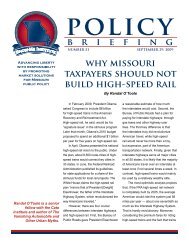MBTA Review - November 1, 2009
MBTA Review - November 1, 2009
MBTA Review - November 1, 2009
Create successful ePaper yourself
Turn your PDF publications into a flip-book with our unique Google optimized e-Paper software.
General Recommendations — No Quick Fixes<br />
There are no “quick fixes” to this myriad of issues. While we were not<br />
asked to provide specific recommendations, there are some general<br />
ones that we would suggest:<br />
Properly Prioritize<br />
Safety Issues<br />
• A high-level MassDOT examination of safety and capital projects<br />
is in order. With 51 projects classified as “a danger to life or limb<br />
of passengers and/or employees,” prioritizing these projects<br />
against public safety needs is imperative. It may require an<br />
extended period to address them properly, but what could be<br />
more important?<br />
Make Expenses<br />
Transparent<br />
• There is no question that the <strong>MBTA</strong> is an expensive and complex<br />
system. It requires large expenditures just to continue operating.<br />
Any thought that these problems can be addressed primarily<br />
through expense reductions is misguided. However, MassDOT<br />
should require more transparency in these expenses, so there is<br />
better control and more oversight in their uses.<br />
Reexamine Debt<br />
• The underlying debt issues should be reexamined in the context<br />
of this review’s findings. In addition, the <strong>MBTA</strong> should not be able<br />
to enter into new debt obligations without MassDOT oversight.<br />
Slow Expansion<br />
• It makes little sense to continue expanding the system when the<br />
<strong>MBTA</strong> cannot maintain the existing one. Slow expansion until the<br />
safety and maintenance priorities can be addressed.<br />
Develop Secure New<br />
Revenue Sources<br />
• If there is any chance for the <strong>MBTA</strong> to begin to close its deficit<br />
gap, there is little question that secure new revenue sources will<br />
have to be developed over time.<br />
Improve Safety<br />
and Service Before<br />
Increasing Fares<br />
• The only major long-term operational success of Forward Funding<br />
is the fact that the riding public paid three fare increases in the<br />
last eight years. That resulted in a cumulative $95M gain. Asking<br />
that same public in 2010 for yet another fare increase because<br />
Forward Funding did not work defies credibility. The riding public<br />
deserves to have tangible evidence that the <strong>MBTA</strong> is improving<br />
safety and service—not deteriorating further.<br />
<strong>MBTA</strong> <strong>Review</strong> | <strong>November</strong> <strong>2009</strong><br />
p. 31






